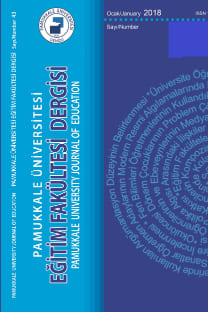RADYOAKTİVİTE ÖĞRETİMİNDE İŞBİRLİKÇİ ÖĞRENME YÖNTEMİ İLE GELENEKSEL ÖĞRETİM YÖNTEMİN BAŞARIYA ETKİLERİ
Bu çalışma, Türkiyeâdeki liselerde, kimya öğretiminde yaygın olarak kullanılan âGeleneksel Öğretim Yöntemiâ ile İşbirlikçi Öğrenme Yöntemininâ başarıya etkilerinin karşılaştırılması amacı ile yapıldı. Çalışma, 2002-2003 eğitim-öğretim yılında Ankara, Gazi Çiftlik Lisesinde, 79 lise II. Sınıf öğrencisi üzerinde gerçekleştirildi. Öğretimden önce öğrencileri tanımak, sosyo-ekonomik durumlarını, grup çalışmasındaki deneyimlerini, kimya öğretiminde grupla çalışmaya karşı isteklerini ve grup çalışmasına bakış açılarını saptamak amacı ile 10 soruluk bir tanıma anketi ve konu hakkında öğrencilerin ön bilgilerini ölçmek amacı ile bir âön bilgi testiâ sunuldu. Bu ön testteki başarı durumlarına göre başarıca eş iki lise II. sınıfından birinde, âGeleneksel Öğretim Yöntemiâ (Kontrol Grubu), diğerine âİşbirlikçi Öğrenme Yöntemiâ (Deney Grubu) ile, âRadyoaktiviteâ konusu işlendi. Konu ile ilgili olarak hazırlanan, 15 soruluk, radyoaktivite kavram testi, öğretimden önce ve sonra olmak üzereâ ilk testâ ve âson testâ olarak uygulandı. Sonuçların değerlendirilmesinden, işbirlikçi öğrenme yönteminin, geleneksel öğretim yöntemine göre daha başarılı olduğu saptandı.
Anahtar Kelimeler:
İşbirlikçi öğretim, geleneksel öğretim yöntemi
x
This study is related to the comparison the effect of âtraditional teaching systemâ largely used in chemistry with cooperative learning method, upon the success of the education process. The study was carried out upon 79 tenth year students studying in Gazi Çiftlik high school in 2002-2003 educational years. The students were subjected to a 10- question primary survey in order to recognize them and determine their socio economical situations and they were given an elementary test to measure their primary knowledge about the subject. There were two classes chosen with equal success rate and both were given the subject of âRadioactivity âone with the âtraditional methodâ (control group) and the other with âcooperative learning methodâ(experimental group.) The evaluation of data revealed that the experimental group was more successful compared with the control group.
Keywords:
Cooperative learning, traditional teaching,
- ISSN: 1301-0085
- Yayın Aralığı: Yılda 3 Sayı
- Başlangıç: 1996
- Yayıncı: -
Sayıdaki Diğer Makaleler
İLKÖĞRETİM FEN LABORATUARI İÇİN TUTUM
Mustafa YEŞİLYURT, Turgut KURT, Atilla TEMUR
ÜNİVERSİTENİN VAR OLUŞ NEDENİ (ÜNİVERSİTENİN MİSYONU) *
LİSE-1 ÖĞRENCİLERİNİN FARKLI İKİ ÖĞRETİM YÖNTEMİNE GÖRE FİZİK BAŞARI
Selahattin GÖNEN, Serhat KOCAKAYA
Habibe TEZCAN, Üzeyir YILMAZ, Mine BABAOĞLU
İSTANBUL KONFERANSI (1876)âNA GİDEN YOLDA İNGİLTEREâNİN âDOĞUâ
FEN BİLGİSİ ÖĞRETMEN ADAYLARININ FEN DERSLERİNDE MATEMATİĞİN
Bilge Taşkin CAN, Berna Cantürk GÜNHAN, Sevinç Öngel ERDAL
THE INTERNET COMPETENCY LEVELS OF TURKISH HIGH SCHOOL STUDENTS AND
İLKÖĞRETİM OKULU ÖĞRENCİLERİNİN OKUL YAŞAMININ NİTELİĞİNE İLİŞKİN
FEN BİLGİSİ ÖĞRETMEN ADAYLARININ SORU SORMA BECERİLERİNİN BLOOM
